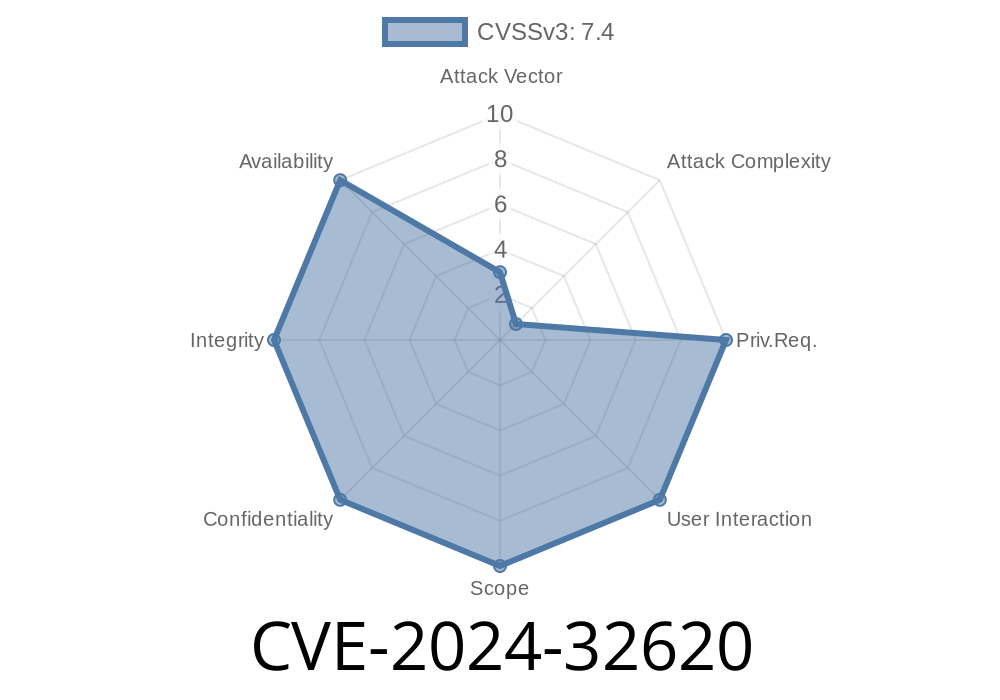The HDF5 library is a staple in scientific computing, forming the backbone for storing and managing large datasets. However, like any complex software, vulnerabilities pop up—and CVE-2024-32620 is one such critical issue affecting HDF5 versions through 1.14.3. In this post, we will break down what this vulnerability is, how it works, and provide simple, exclusive details on how an exploit could affect systems using HDF5.
What is CVE-2024-32620?
CVE-2024-32620 documents a _heap-based buffer over-read_ in the H5F_addr_decode_len function located in H5Fint.c in the HDF5 source code.
This vulnerability allows an attacker to trick HDF5 into reading past the boundaries of a buffer. As a result, the program could access sensitive data by mistake or, even worse, cause _corruption of the instruction pointer_—potentially allowing code execution.
Official CVE Reference
- CVE page: https://cve.mitre.org/cgi-bin/cvename.cgi?name=CVE-2024-32620
- HDF5 Github issue: https://github.com/HDFGroup/hdf5/issues/2548
What Went Wrong? (Technical Overview)
The vulnerable function, H5F_addr_decode_len, does not do proper bounds checking when reading address lengths from a buffer. If an attacker can control the HDF5 file content (for example, by distributing a malicious .h5 file), they can craft file headers that trick this function into reading past the end of allocated memory.
Let’s look at an approximation of how the vulnerable code behaves
// Snippet from H5Fint.c in HDF5 <= 1.14.3
herr_t H5F_addr_decode_len(const uint8_t **p, size_t len, haddr_t *addr) {
size_t i;
*addr = ;
for(i=; i<len; i++) {
// Vulnerability: no check that *p is valid for i bytes!
*addr = (*addr << 8) | *(*p)++;
}
return SUCCEED;
}
Suppose len is greater than the remaining bytes in the buffer *p. In that case, this loop will _read beyond_the buffer boundary, collecting arbitrary bytes from the heap.
Craft a Malicious HDF5 File
The attacker creates an HDF5 file with headers that explicitly call out a large value for len—one much larger than the actual data block.
Trigger Heap Read
When a vulnerable application loads this file, it passes the attacker’s length to H5F_addr_decode_len.
Corrupt Instruction Pointer
If the over-read causes the function to collect data into the addr variable that later gets used in pointer arithmetic, and if that leads to a function call or a jump, the attacker can potentially hijack the flow of execution.
Here’s a Python-style pseudocode for a simple exploit
# This will simulate creating a buffer that HDF5 will over-read:
malicious_file = b"\x08" + b"A" * 4 # len=8, but data only 4 bytes
with open("exploit.h5", "wb") as f:
f.write(malicious_file)
If the application tries to read this file and parse the address with len=8, the function will read the rest from wherever happens to be next in memory—possible heap-allocated data or instructions.
Note: A real-world exploit may require in-depth knowledge of memory layout, but proof-of-concept crashes (segfaults) are straightforward.
Mitigation
- Upgrade: The best fix is to upgrade to the patched version of HDF5 (check the HDF5 downloads page for updates and patches).
- File Validation: Do not open HDF5 files from untrusted or unknown sources until you have updated.
- Fuzz Testing: If you’re embedding HDF5 in security-critical software, implement fuzz testing to catch similar vulnerabilities.
References and Further Reading
- CVE Details for CVE-2024-32620: https://cve.mitre.org/cgi-bin/cvename.cgi?name=CVE-2024-32620
- Official HDF5 Repository: https://github.com/HDFGroup/hdf5/
- Issue Tracking: https://github.com/HDFGroup/hdf5/issues/2548
- NIST NVD: https://nvd.nist.gov/vuln/detail/CVE-2024-32620
Keep Software Updated: Vulnerabilities like this surface regularly.
- Understand Third-Party Risks: Many scientific tools share data formats; one bug can ripple through many tools.
Stay safe and keep your libraries patched! If you’re working in a field that relies on complex data formats like HDF5, always subscribe to security advisories and automate updates where possible.
Timeline
Published on: 05/14/2024 15:36:47 UTC
Last modified on: 07/03/2024 01:56:51 UTC
